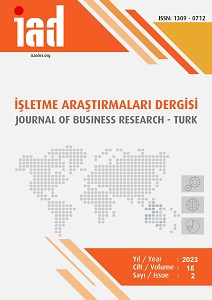Türkiye’de X, Y ve Z Kuşaklarının Gözünden Çevrimiçi Müşteri Yorumları: Nitel Bir Çalışma
Online Customer Reviews from the Perspective of Generations X, Y, and Z in Turkey: A Qualitative Study
Author(s): Sumru Küçüka, Farid HuseynovSubject(s): Business Economy / Management, Marketing / Advertising, Socio-Economic Research
Published by: Orhan Sağçolak
Keywords: Online Customer Reviews; Online Shopping; Generation X; Generation Y; Generation Z;
Summary/Abstract: Purpose – The purpose of this research is to provide a perspective on how and in what direction the generations X, Y, and Z are affected by online customer reviews when making a purchase decision. The role of online customer reviews in the purchasing decision was investigated. The study also aims to understand the review reading habits of these three generations as well as their level of trust in the reviews. Design/Methodology/Approach – Face-to-face interviews were conducted with 25 participants using semistructured interviews. Content analysis was used in order to analyze the data in depth. Although the studies in the literature were considered, the themes were formed according to the interview data, using the inductive method. Some codes differ by generation. The differences in the codes helped to determine the similarities and differences between the generations. Findings – The themes that emerged as a result of the interviews with the participants are Selectivity in Comments, Trust in Comments, Relationship with Comments and Customer Profile. The findings are provided in detail by the themes and categories. Discussion – Previous studies on online customer reviews were compared to the results of this research, considering the themes emerged in the analysis. Similar to all qualitative studies, one of the limitations of the study is the low power of the sample to represent the population. Qualitative researches do not aim to generalize the results to the population, but to represent the sample and to provide a more in-depth perspective on the research question. Another limitation is generation Z participants’ not having economic freedom. As the generation Z is aged 11-26 at the time of the research, healthier results can be obtained if the research is repeated when they have economic freedom.
Journal: İşletme Araştırmaları Dergisi
- Issue Year: 15/2023
- Issue No: 2
- Page Range: 1531-1548
- Page Count: 18
- Language: Turkish

